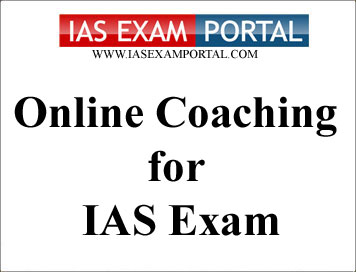(Sample Material) IAS PRE GS Online Coaching : General Science - "Science and Technological Development in India"
Sample Material of Our Online Coaching Programme
Subject: General Science
Topic: Science and Technological Development in India
Evaluate Yourself
-
Science and Technology Infrastructure: Scientific and technological activities in India are carried out under a wide set-up consisting of Central government, State Governments, higher educational sector, pubic and private sector industry and non-profit institutions/associations. Notable among these are: the Council of Scientific and Industrial Research (CSIR); Indian Council of Agricultural Research (ICAR); and Indian Council of Medical Research (ICMR). In addition, there are many laboratories of various departments / ministries, viz. Department of Atomic Energy, Department of Electronics, Department of Space, Department of Ocean Development. Defence Research and Development Organisation, Ministry of Environment and Forests, Ministry of Non-Conventional Energy Sources and the Ministry of Science and Technology. Further, there are over 1,200 in-house research and development units in industrial undertakings supporting research in their respective industries.
-
New Science and Technology Policy 2003 : The policy outlines the approach to S & T governance, optimal utilisation of existing physical and knowledge resources, development of innovative technologies, systems and technologies for mitigation and management of natural hazards, generation and management of intellectual property and creation of awareness amongst general masses about the use and benefits of science and technology.
Department of Science and Technology
-
The Department of Science and Technology was set up in May 1971 with the objective of promoting research in new areas and to play the role of a nodal department for organising, co-ordinating and promoting science and technology activities in the country.
Research and Development Programmes
-
The Department of Science and Technology has been playing a crucial role in identifying and promoting front-line and priority areas on Research and Development (R&D) in various disciplines of science and engineering. This support is provided through (Science and Engineering Research Council (SERC) - an advisory body consisting of eminent scientists and technologists draw) from academic institutions like IITs, universities, national laboratories and industry. The Council through its advisory committees, assists the Department not only in peer reviewing the proposals but also identifies newer and inter-disciplinary areas of R&D for concerted efforts.
-
Science and Engineering Research Board (SERB) has been established by the Department in 2010 as an autonomous body for promoting basic research. The Board is expected to play a major role in promotion of extra mural research in the country.
-
Assessing the importance of the emerging, highly interdisciplinary field of Nanoscience and Technology, (a national programme titled “Nanomaterials Science and Technology Initiative (NSTI)” has been started. The programme focuses at overall research and development in nanoscience and technology) with givour so that India can become a significant player in the area and contribute to the development of new technologies.
-
On the occasion of the 50th anniversary of India’s Independence, the Government launched (Swaranjayanti Fellowships for enabling outstanding young scientists to attain world class levels in science). The Fellowships are open to (Indian scientists in the age group of 30-40 years), with proven capability for outstanding research work exploring new frontiers in their field of specialisation.
-
Infrastructure Development: ‘Intensifica-tion of Research in High Priority Areas’ - IRHPA has helped in strengthening the infrastructure and research capabilities in selected areas of science and engineering.
-
In order to provide and improve basic infrastructure in academic sector for research and teaching a scheme viz. (Fund for Improvement of S&T Infrastructure in Universities and Higher Educational Institutions (FIST) was initiated during the 9th Five Year Plan).
-
Human Resource Development: In order (to motivate bright young minds at their secondary school / college levels and to encourage them to stick on to a career in science, a new scheme called Kishore Vaigyanik Protsahan Yojana has been initiated).
-
Women Scientists Scheme (was launched during the year 2002 by the Department of Science and Technology. The scheme provides support to women scientists, with or without a break in career, to pursue science in all its aspects and encourage them to continue in the scientific profession and also contribute towards application of science and technology to societal development.
Technology Development and related Programmes
-
Specific mention may be made of the Medium Throughout Facility, Pharmacological Testing Facility and Centre for Pharmaco-kinetic and Metabolic Studies at CDRI, Lucknow, Immunomodulatory Potential Testing Facility at IICB, Kolkata; National Facility on Transgenic and Gene Knockout Mice at CCMB, Hyderabad; and National Centre for Bioavailability at National Institute of Pharmaceutical Education & Research, Mohali).
-
The Department has set up an autonomous body - Technology Information, Forecasting and Assessment Council (TIFAC).
Technology Development Board
-
The (Technology Development Board) was constituted in September 1996. The Board (provides financial assistance to) industrial concerns and other agencies for attempting development and commercial application of indigenous technology or adapting imported technology for wider domestic application.
-
The TDB institute a ‘National Award for successful commercialaisation of indigenous technology’ by an industrial concern to be given away on the (Technology Day, i.e. 11 May every year commencing from 1999). (The National Award consists of two components : (i) to the industrial concern which has successfully commercialised the indigenous technology and (ii) to the developer / provider of such technology).
National Accrediation Board for Testing and Calibration Laboratories
-
The National Accrediation Board for Testing and Calibration Laboratories (NABL) provides formal recognition for technical competence of testing, calibration and medical laboratories.
-
Based on evaluation, of NABL operations by APLAC in 2000, NABL has been granted signatory member status by APLAC and International Laboratory Accreditation Cooperation (ILAC) under their Mutual Recognition Arrangements (MRAs).


